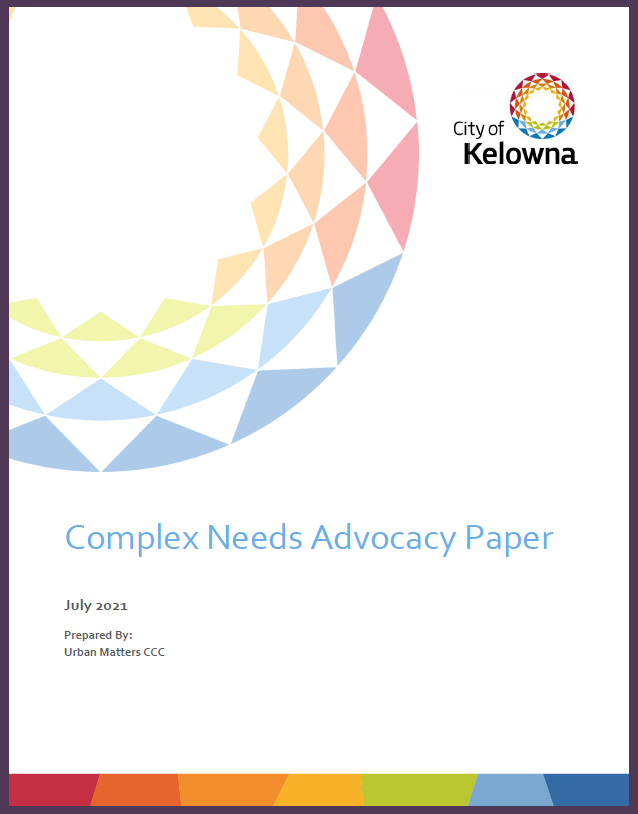
14 February 2023
A transformative model for complex care housing
Research and advocacy paper by Urban Matters CCC aids in securing new housing spaces for people with complex care needs in the Central Okanagan
By Pauline Sydenham
If you look back over the years, you may notice that your housing needs and living arrangements evolved just as you did. Perhaps you shared an apartment with roommates once or moved closer to work to minimize your commute. You may have relocated back to your hometown to be closer to family.
For people with complex needs who have overlapping health challenges – such as mental health or substance use disorders, acquired brain injuries, Fetal Alcohol Spectrum Disorder, and developmental disabilities – accessing safe and supportive housing that meet their specific needs can be a tremendous challenge.
In 2020 and 2021, our team at Urban Matters supported the City of Kelowna in better understanding the housing needs and related supports for those with complex needs in the Central Okanagan region. As a result, B.C.’s Interior Health regional health authority and the City of Kelowna, along with the provincial Ministry of Mental Health and Addictions, announced the creation of up to 20 new complex care spaces that will deliver better housing and supports for people with complex care needs in the region. These spaces are set to open early this year.
This transformation is part of a larger systems change that has overall resulted in a stronger, more integrated network of support for those with complex needs – a new model of care. Furthermore, this shift addresses one of several important components in the provincial homelessness strategy.

“Our team is honoured to have contributed to the Complex Needs Advocacy Paper and help guide local communities, governments, organizations, health authorities, and service providers to meet the housing and health needs of the region’s most housing-vulnerable,” says Erin Welk, co-CEO and project lead with Urban Matters CCC. “Through our research, we found that supports and services for people with complex needs were fragmented, either not easily accessible or missing entirely. We worked with local service providers and decision-makers to bring forward a vision for a housing model – supported by evidence – that will allow individuals with complex needs to enter stable housing and gain access to a coordinated and increased level of care.”
A fragmented system of care
Individuals with complex needs are served through various support systems across multiple sectors and services. In addition to the high level of support needed in this population, supports are often scattered throughout the community, creating additional barriers to access. We spoke to frontline service providers in the region and found that 50 to 75 per cent of clients accessing social services experience complex needs. Yet there are few housing options and a lack of qualified staff dedicated to supporting this community.
Furthermore, even if those with complex needs can access care from hospitals or institutions, there are few transitional housing options and supports to help them integrate back into their community, leading to a repetitive cycle of being institutionalized over and over again. This cycle also further fuels stigma, making it even more challenging to reintegrate into the community and feel a sense of belonging.
Research points to one critical intervention that can make a huge impact in interrupting this cycle: improve housing and build a coordinated system of care dedicated to those living with complex needs. The aim is to securely house people first and then foster self-sufficiency through different forms of support or treatment. Without this, those experiencing complex needs will continue to be highly vulnerable to experiencing homelessness, have inadequate or precarious housing, and be overrepresented in interactions with police and emergency services.
“Complex care housing is an exciting development because it goes beyond a reactive response to individuals facing complex challenges and instead sets up an integrated approach to housing with appropriate and timely supports. Over time, these supports can help to reduce negative interactions these individuals have with other parts of the system. When people get the support they need, it builds trust and fosters a sense of belonging in our communities,” Welk says.
As of 2021, data suggests there are roughly 249 individuals in the Central Okanagan region with complex needs. However, this number is likely underestimated as there is no single institution that specifically collects data on this community and no consistent method for understanding the full scale of individuals with complex needs. While 249 individuals may seem like a small population compared to the more than 190,000 people living in the Central Okanagan, available data shows that the current system of housing and care for those with complex needs in the region costs roughly $14M to $18M annually. In contrast, an integrated housing and health model can lead to a cost savings of between $4.5M to $8.5M annually.
A regional approach to complex care housing
Working within a coalition consisting of the City of Vernon, the District of Lake Country, the City of Kelowna, the City of West Kelowna, and the Okanagan Indian Band, our team gathered research and data to develop the Advocacy Paper.
“Our role was to help foster collaborative and innovative thinking around a system-level challenge that is impeding progress on homelessness,” Welk says.
“This report was the result of deep and trusting work among communities to exchange knowledge and information in service of those in the community with complex needs.”
Undertaking this work was crucial for aligning the region’s vision for more robust complex needs housing with the priorities and mandates of the provincial government – in particular the Ministry of Mental Health and Addictions, Minister Responsible for Housing, and the Ministry of Health who are tasked with establishing new Complex Care housing in British Columbia.
The new complex care spaces are expected to open this winter. The service model is consistent with Kelowna’s Journey Home Strategy and has shown to be suitable and effective in supporting people with complex needs. Interior Health will now work with community partners and the City of Kelowna to confirm locations and service providers.
Our team at Urban Matters is excited to see how this model will transform how we think about housing. More importantly, we look forward to seeing the impact of the new complex care spaces in improving lives in the Central Okanagan region!




